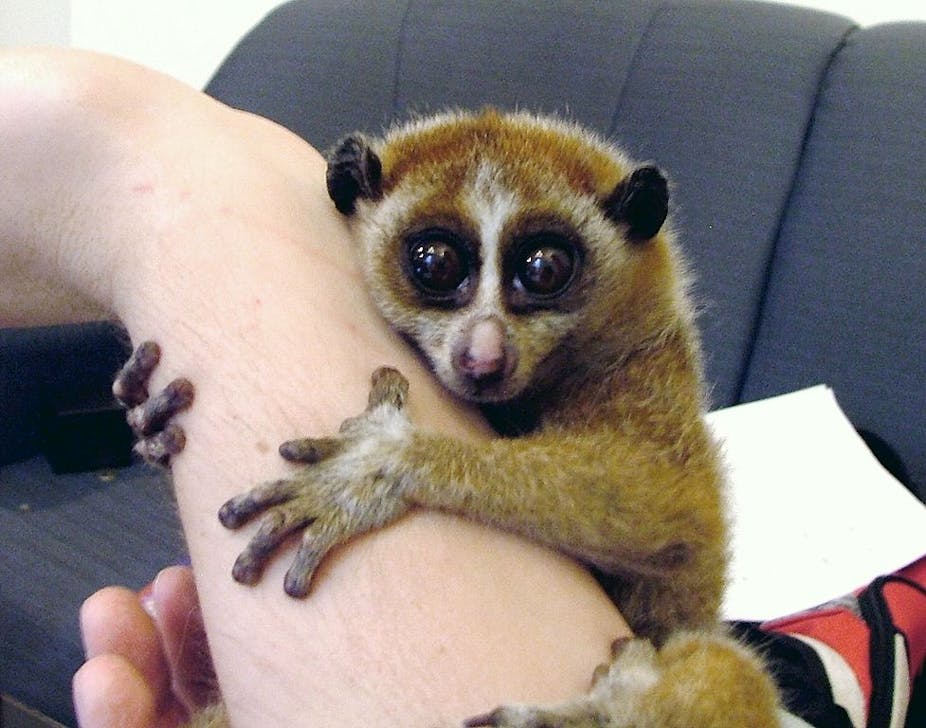It may come as a surprise to discover that it is perfectly legal in the UK to keep primates, such as marmosets, loris, capuchins or squirrel monkeys, as pets.
Perhaps more surprising still is that there is no requirement to register or (in some cases) hold a licence for such exotic creatures. The UK Parliament’s Environment, Food and Rural Affairs select committee has published a report that examines the current situation – but does not call for a ban on primate keeping, despite acknowledging that it was the recommendation of the majority of those giving evidence. Bans on keeping primates have been introduced in a number of coutries including Belgium, the Netherlands, Denmark, Sweden, Australia and some US states.
Clearly, the keeping of primates as pets is a hotly contested area. Many people would argue that keeping primates in captivity should be banned entirely. They are after all wild animals, not to be kept for the pleasure of the public. They have complex needs, including social interaction and a varied diet and environment. On the other hand, some hold that zoos, which provide education, conservation and welfare services in the keeping of primates, are justified in maintaining captive populations, while private owners are not.
This argument risks creating an artificial divide that implies that zoos are better places for primates to be kept than in private hands, if they must be kept in captivity at all. From my own experience conducting research in zoos, it is clear that zoo life is never so black and white.
Meeting their needs
Keepers often work tirelessly for the benefit of the animals, trying to balance the welfare needs of the animals against the wants of the public and the constant limitations of money, time and space. The outcomes may not always be ideal, but this is done out in the public eye, and in the UK, under the guidance of BIAZA, the organisation that represents the role of zoos and aquariums in promoting education, conservation and welfare.
But for primates kept as pets, there is no equivalent body to represent the needs of these animals, no animal registry or licence required, and no one to inspect and ensure they are properly cared for.
In the UK, primate keeping must comply with the standards of the Animal Welfare Act 2006, and also follow the “Primate Code”, introduced by the Department for Environment, Food and Rural Affairs (Defra) in 2010 as a guide to the needs of captive primates kept in private collections.
The code is a guide to the primates’ social, environmental and physical needs that have a direct impact on their welfare, and how owners should meet these needs. It is due for review in 2015, and this has prompted the committee to produce this study on how best to address some of the monitoring and welfare issues of privately held primates, and how best to improve primates’ welfare.
The problem is not that primates kept in private collections are necessarily badly cared for, but that no one really has any idea how many are kept, where, and in what conditions. Estimates range from anywhere between 1,000 and 20,000 primates, and there is no clear information about which species are kept as pets.
The guidelines provided in the code are specific neither to the pet owner (individual, zoo, circus), nor the species of animal. This latter point is particularly important, given that the rise in demand from the pet trade for exotic animals is causing increasing problems for maintaining viable populations of threatened species in the wild. This also makes revising the Primate Code challenging: it is impossible to provide species-specific advice for primate carers, as the report recommends, without prior knowledge of which species people own.
The difficulties begin even with definition of the term “pet”. It is defined in the report as an animal, “kept alone in domestic settings, primarily for the purpose of companionship or personal interest”. On the other hand the report acknowledges that Defra has previously stated that to keep a primate in a domestic setting, even when not caged, would be likely to breach the Animal Welfare Act, due to their complex social needs.
Licensing as a first step
As a solution, the report suggests that primate owners be required to register their pets, which would at least provide information on who owns what that is so far missing. This is the first and most important step that can be made towards improving guidelines and legislation to monitor the trade. In addition, a more comprehensive licensing system is proposed, which would allow tighter regulation and easier tracking of primates in the pet trade.
While this initial step seems promising, the bigger debate still remains: whether implementing a ban on keeping primates as pets is necessary, and whether it would be effective. One of the arguments against a ban asserts that it is “arrogant” to assume that zoos can care for primates better than private collectors. But without more accurate data on the current state of private primate collections, there’s no basis for this claim. Better information would certainly help to counter claims that a complete ban is baseless, and to address issues of cost.
While many of these arguments against the ban consider the effects on humans, it’s notable that those in favour of a ban consider the outcomes on the animals. A primate trade ban in the UK could have a positive impact on conservation efforts and welfare – and this is the approach we need, one that centres on the needs of the primates. Underlying this report, the question remains: for what reason do we need to keep primates in captivity? The only answer should be for the good of their species, not ours.

